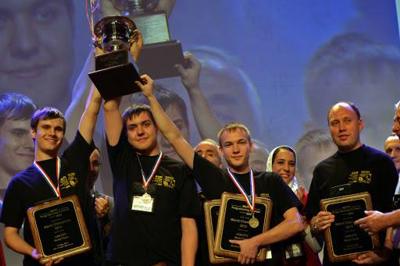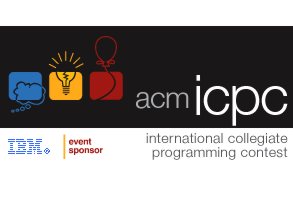| Russian Students Break Contest Records |
| Written by Sue Gee | |||
| Wednesday, 27 May 2015 | |||
|
A team from ITMO University in St. Petersburg emerged as the winners of the 2015 ACM – ICPC and were the first team in the history of the competition to solve all of the problems. The team also beat its own record for highest number of wins by becoming the Gold Medal Winners for the sixth time. The International Collegiate Programming Contest is a global competition for universities. It is organized under the auspices of the ACM - Association of Computing Machinery, the professional computing membership organization that, in its own words is the world's largest educational and scientific computing society.
The contest traces it roots to a competition held in Texas in 1970 that quickly spread through the US and Canada. It evolved into a multi-tier competition by 1977 when the first finals were held at the ACM Computer Science Conference. In the same year IBM became the sponsor of the competition. Almost 40 years later, for the 2015 competition, 38,160 contestants (12,720 teams) from 2,524 universities took part in regional contests in 101 countries. From this pool 128 teams advanced to the World Finals, this year held in Marrakech, Morrocco. The IPCP Fact Sheet explains the format and the way the winning teams are chosen,: The contest pits teams of three university students against eight or more complex, real-world problems, with a grueling five-hour deadline. Huddled around a single computer, competitors race against the clock in a battle of logic, strategy and mental endurance. Teammates collaborate to rank the difficulty of the problems, deduce the requirements, design test beds, and build software systems that solve the problems under the intense scrutiny of expert judges. For a well-versed computer science student, some of the problems require precision only. Others require a knowledge and understanding of advanced algorithms. Still others are simply too hard to solve – except, of course, for the world’s brightest Judging is relentlessly strict. The students are given a problem statement – not a requirements document. They are given an example of test data, but they do not have access to the judges’ test data and acceptance criteria. Each incorrect solution submitted is assessed a time penalty. The team that solves the most problems in the fewest attempts in the least cumulative time is declared the winner.
For the first time ever in all the problems set - a total of 13 - were solved inside the deadline. The team from the St. Petersburg National Research University of IT, Machanics and Optics that performed this feat included Artem Vasilyev and Boris Minaev – bronze medalists of the last year’s championship - and Gennadii Korotkevich, world champion of 2013 as part of the ITMO University team and the first in history winner of all prestigious programming competitions, including Google Code Jam, Facebook Hacker Cup, and Topcoder Open. Towards the end of this video, the team coach Andrey Stankevich explains the selection process and training regime that accounts for this level of success:
Gold Medals for 2015 also went to another Russian team, from Moscow State University were the Silver Medalists, and to the University of Tokyo, with both having solved 11 problems. If you are interested in the problems the students faced this year they are available on the ICPC site together with a scoreboard that indicates the time each required. Of the set of thirteen (A to M), Problem G, which was solved only by ITMO and Problem K, solved by ITMO and Toykyo, and Problem B only by five teams are "hard" problems that distinguished elite teams. Problem A on the other hand is one that all teams solved, although a small number of teams required two tries to do so. It all begs the very important question what are these guys doing right to turn out such success? More InformationACM-ICPC International Collegiate Programming Contest 2015 World Finals Problems (pdf) Programmers of ITMO University are the winners of the 2015 ACM for the sixth time Related ArticlesFacebook Cup 2015 Underway Solutions Available Google Code Jam - 45,000 Registrants, One Winner Google Code Jam 2015 Adds Distributed Contest
To be informed about new articles on I Programmer, install the I Programmer Toolbar, subscribe to the RSS feed, follow us on, Twitter, Facebook, Google+ or Linkedin, or sign up for our weekly newsletter.
Comments
or email your comment to: comments@i-programmer.info |
|||
| Last Updated ( Wednesday, 27 May 2015 ) |




